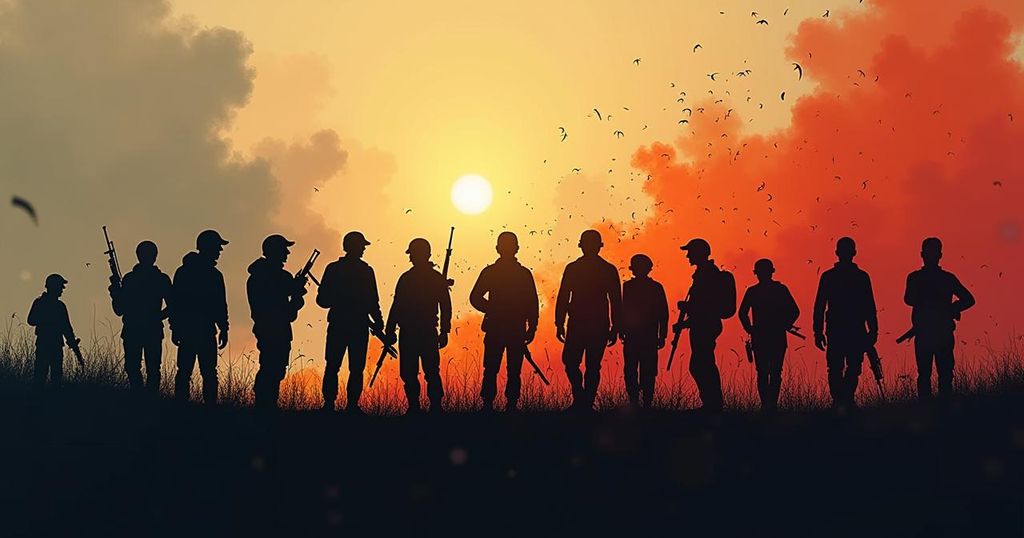Implications of the Wagner Group Rebellion on Russia’s Military Endeavors in Ukraine
The Wagner Group, rebelling against Russian military leadership under Yevgeny Prigozhin, has claimed military victories and accused Moscow of neglecting its troops. This rebellion could seriously impact Russia’s military operations in Ukraine, with experts suggesting it might signal an end to current strategic efforts if Wagner withdraws from frontline positions.
The Wagner Group, engaged in an armed rebellion against Russian military authorities, has accused the government of jeopardizing its personnel and has announced the capture of military headquarters in two cities, alongside downing three Russian helicopters. This insurrection, led by Yevgeny Prigozhin, formerly aligned with President Vladimir Putin, has intensified the political instability within Russia amidst a concerted Ukrainian counteroffensive and growing Western pressure, raising fears of a potential civil conflict. The current rebellion reflects underlying tensions that have been developing over time. Recently, Defense Minister Sergei Shoigu, backed by President Putin, mandated that all private military contractors, including Wagner, sign formal contracts with the defense ministry—a move that would encumber Prigozhin’s quest for autonomy. Prigozhin has contended that since his refusal to comply with these demands, his forces have faced severe shortages of ammunition, particularly during intense engagements in Bakhmut, and accused the ministry of orchestrating missile strikes on Wagner positions. In a pointed expression of his outrage, Prigozhin stated, “These are someone’s fathers and someone’s sons,” while referring to the casualties among his troops. He underscored the severe resource constraints faced by his forces: “Because of the lack of ammunition, our losses are growing exponentially every day.” Amidst ongoing clashes, the Wagner chief expressed dissatisfaction with the Russian defense leadership and threatened to withdraw his fighters from Bakhmut, a city that has been the focal point of Wagner’s operations for over 200 days. The dynamics surrounding this rebellion prompt speculation regarding the potential implications for Russia’s military endeavors, particularly in Ukraine. If Wagner forces formally reallocate their focus away from Ukraine, it could signify a significant setback for Russia, as their operations have been pivotal to limited victories in locations like Bakhmut and Soledar. Yohann Michel, an analyst with the International Institute for Strategic Studies, has suggested that a withdrawal of Wagner forces could mean the conclusion of this phase of the offensive for Russia: “If he’s removed from the front line… it is the end of this phase of the offensive for Russia.” This statement highlights the strategic vulnerability that the Russian military may face should Prigozhin’s influence wane or if he steps back from his role. Furthermore, a U.S. official indicated the potential risks associated with replacing Prigozhin, citing his unmatched effectiveness among military contractors. Reports have indicated the movement of Wagner forces toward Moscow, and Prigozhin has declared intentions to instigate a change in military leadership, further destabilizing the situation. The region around Lipetsk has witnessed the activity of Wagner mercenaries, while Rostov-on-Don has been reported as a site of occupation by their forces. In this turbulent context, the rebellion led by the Wagner Group raises critical questions about the capability of Russian military operations in Ukraine and the broader implications of internal discord within the country’s military leadership.
The Wagner Group, a private military company, has played a substantial role in Russia’s military efforts in Ukraine. Historically, the organization has garnered attention for its clandestine military operations and its influence under the leadership of Yevgeny Prigozhin, a figure closely tied with the Kremlin. However, recent tensions arising from demands by Russian military authorities for private contractors to formalize their relations with the state have exacerbated existing fractures. Prigozhin’s subsequent refusal and accusations against the Russian defense establishment signal a pivotal conflict that may impact Russian military strategy and operations in Ukraine. This rebellion occurs against a backdrop of increased Ukrainian offensives and ongoing challenges posed by Western sanctions and geopolitical pressures on Russia.
The ongoing rebellion of the Wagner Group represents a significant turn of events within the context of the Russian military’s involvement in Ukraine. Prigozhin’s actions and statements illustrate severe tensions between his organization and the Russian defense leadership, with potential ramifications for the effectiveness of the Russian military on the battlefield. Should Wagner forces withdraw or become incapacitated, experts suggest this may mark the cessation of this strategic phase of operations in Ukraine, compounding the already precarious position of Russian forces.
Original Source: www.livemint.com




Post Comment